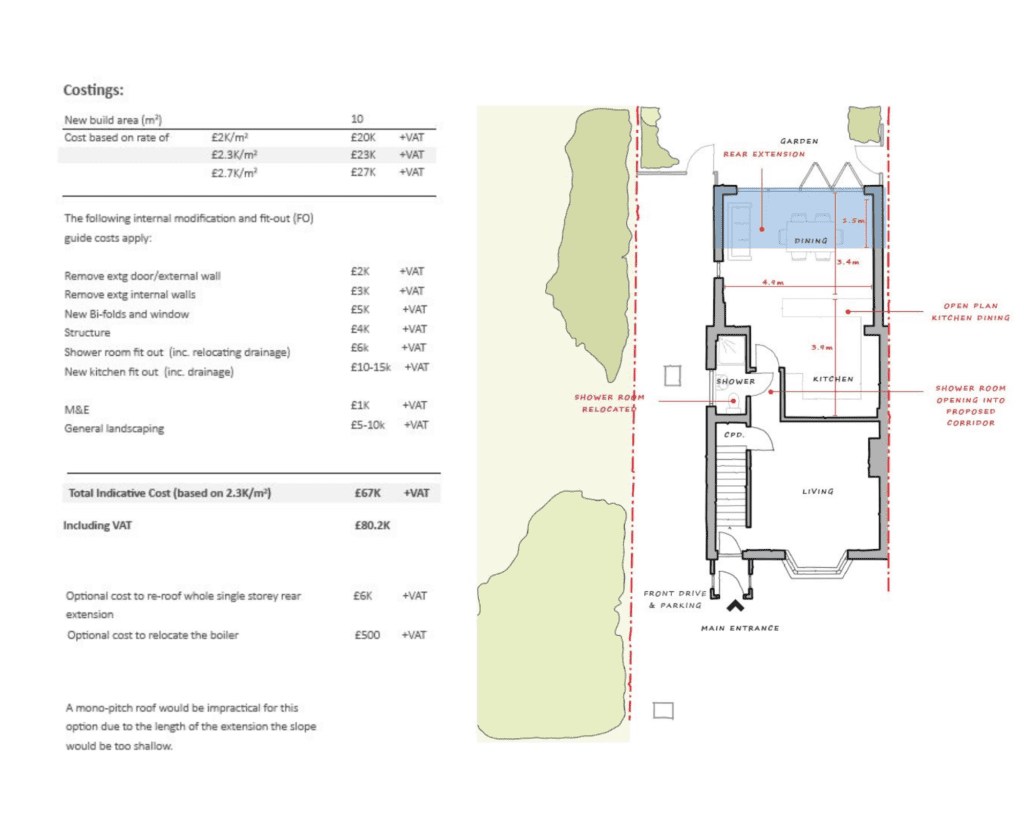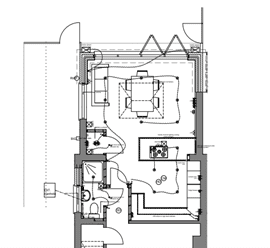If you are planning an extension or renovation, I can take a pretty safe bet on the fact that you have been searching for the answers to the question ‘how much does it cost to build an extension?’ I can also bet that the answers you have obtained have varied wildly, and here is why.
The cost of an extension or renovation can vary due to a few key factors;
- Where you are in the country – Your geographical location will make a difference here. It is generally understood that the further north you go, the less you will pay for both labour and materials, although I do believe that gap is beginning to close somewhat. Down here in the South, the material and labour costs are higher, plus you will pay more for the land or house in the first place, which of course needs to be factored in. The good news is that your ceiling price or end value will be higher.
- What route are you taking to build?
Construction and self-build magazines will talk about square metre rates of £1800 or less – we have not seen rates like these for many years. Often, in these self-build magazines, clients have undertaken much of the work themselves. This will usually not only include taking on all project management – which involves planning the project programme, bringing all the individual trades in at the right times, but also physically undertaking building work themselves.
Our clients generally have busy lives and do not have the time or the skill necessary to undertake this level of work for a cost-saving, so the most common procurement route for people who want to extend and renovate, is the traditional route.
This will mean that your project is fully managed by one building company, which will employ all the sub-contractors, programme the project and undertake all the work until completion. They will do this for a fixed cost, over a fixed timeframe, to the standard set by you (the drawings and specifications that you have set out with your architect)
The builder will price the work with ideally around 12% – 20% of profit for themselves, which is fair. They take on all the risk and liability and are your single point of contact throughout the build.
The average square metre rate that we see down here in the South, for a new build area is between £2,300 and £3,000. This is for the finished area, per floor, but does not include things like sanitaryware, kitchen and utility fit-outs, log burners etc.
Bespoke glazing, complicated structural work and high-end details can push the metre squared rate up further.
Less is More…
A bizarre fact is that the smaller the build, the higher the relative square metre rate. This is because equipment etc. will still need to be brought onto the site, sometimes details and junctions can be trickier to work around when dealing with smaller areas, so a small front extension to form a porch for instance can have a square metre rate of over £2,700 per sqm.
So, what about some example budgets?
Ok, looking at the new floor area only, as a very rough guide for an extension this is an example of costings for a recent extension that has been through our practice. This is for a simple, single-storey extension, with a new kitchen, new shower room and re-roofing of the existing extension.

As you can see from this example, it would be difficult to determine budget costings without drawings. You need areas and a design to understand the scope of the work before we can put an estimate on it.
A fixed price is based on a different set of drawings. These are called construction drawings and have a significant level of detail on them, in order for the builder to give a fixed price for the work.

What other costs should I consider?
VAT – If you are extending or renovating, you must consider 20% VAT (correct at the time of writing in Nov22) A new build property will be exempt, which can be a huge cost saving if you are thinking about a big extension and renovation of an existing house – it might be worth exploring the option of the new build if that is appropriate.
Contingency
It is wise to keep aside up to 15% (of the build cost) as a contingency. The builder will do everything they can to price everything that they can envisage needing work, however on occasion, particularly when dealing with existing buildings you may have to pay for work that could not have reasonably been foreseen by the builder. Often this is during the groundwork phase, however, there may be an existing structure that requires replacing etc. Things that you cannot anticipate prior to starting work on site.
Other fees and consultants.
Your Architect will be your first port of call and will be with you throughout the project.
This will take you from design, through planning, through construction drawings and building regulations, and support you on-site until the end of your build. They will also liaise with every other consultant involved in your project.
Expect to pay less for less service, ie. Fewer design options and output in the early stages of managing the planning and building regulations together with other consultants work yourself. Make sure that this is the service that you really want from your architect. If you want an end-to-end service, you will have less stress overall. Different architects will produce varying levels of information for their fee.
A fully qualified Architect will likely cost you more than a technician or a technologist, you are paying for their expertise. There will also be a difference in cost between a sole practitioner and a practice. Make sure you are comparing like for like when looking at quotes for services. Be sure to ask your architect the right questions when interviewing so you can be sure that you are getting the value of service for your requirements. You can talk to us more about this by booking a free consultation with our expert Architects.
An Architect will usually offer a fixed fee for their services at each stage. You would only expect this fee to change if additional work was instructed or there was a big change to the brief.
Here is a rough guide to Architects’ Fees by the size of the project for 2023:
- A single-storey rear extension with little internal modification: £5,000 – £9,000
- A more substantial extension, internal work, and modifications: £10,000 – £13,000
- A two-storey extension with some internal modifications: £12,000 – £17,000
- A medium-sized house, refurbishment with extensions, most of the house needing work: £18,000 – £24,000
- A large house, multiple extensions, significant refurbishment, high-end detailing £25,000 – £38,000
- A large new build house, high-end detailing £39,000 – £80,000
This last category is the broadest as this type of house can really vary in the specification.
Every fee given will be based on the scope of your project and the amount of work involved, but this will give you a guide to work from.
Who else?
There are a number of other consultants and services that might be necessary for your project. The list below will highlight most of the other consultants involved in a residential project, however, you may not require all these others, or there may be others you wish to add.
- A topographical survey – we conduct a full measured survey of every property that we work on, however, for sites that have a lot of trees, that are very steeply sloping, or land-only developments for new builds, we would recommend a topographical survey to fully understand the land and levels. The cost for this service is anywhere between £1,000 – £3,000, depending on the size and complexity of the site.
- An Estimator – At the private residential level, an Estimator is usually used prior to planning, using design drawings and the scope of works and materials. This is to obtain greater cost certainty should you wish, before committing to a design to take forward to planning. We give estimated costings within our design stage, however, an Estimator will provide greater detail and more accurate costings for you. This is optional and not all clients feel that they need to use this service. An Estimator may cost anywhere between £400 for a small to medium-sized project to £1,500 for a large new build.
- Arboriculturist – If you have significant trees on your land, particularly if they are close to the proposed building, the local authority when it comes to planning, will require you to have a tree report. This information is useful for design purposes and construction drawings/on-site work. Depending on the level of trees on the site, expect to pay anywhere between £300 and £2,000.
- Ecologist – In the same way, that the projection of trees will be policed at planning, so too will the ecology on your site. At the residential level, this is most commonly bats but can extend to newts, badgers and other flora and fauna. It is important to get the timing of these surveys right. To find out more about bats read our blog here. An initial survey to determine the presence of bats will usually cost around £600. If further surveys are required, these can extend into the thousands and is dependent on the level of bat activity. Further surveys can be between £1,500 and £5000.
- A Structural Engineer will feature in almost every single project. They will be required to design any structural elements for your build. Their calculations will be required for building regulations purposes, and for the construction of your project. The level of work required from a Structural Engineer varies massively from project to project. Prices start, for a small extension with minimal requirements at around £600 but can extend to £5,000 or more for large, new build more complex work.
- Approved Inspector – A private company that is given the powers to procure the Building Regulations in lieu of the local authority – this method is preferred by builders and other consultants alike, an Approved Inspector will definitely feature as one of your power team and like a Structural Engineer, their fees vary with project size. A small extension with minimal work will start at around £600. With a large, new build project at £2,500 or more – depending on the level of involvement.
Others that you may wish to account for;
- An Interior Designer – Best to get an Interior Designer involved from the beginning of the design stage. Their fees will vary depending on their level of involvement. Some provide fixed fees, and some work at an hourly rate. Their role can vary from simple consultations and input in design meetings to the creation of mood boards and specifications and then finally sourcing the products for you.
- Lighting Designer – Will work in a simar way, and in conjunction with an interior designer. From consultancy at the design stage to specification and sourcing of products for your build.
- An Energy Consultant – Their involvement can be for small or large projects alike and again, can vary with involvement and project size. They can offer consultancy, through overheating studies, product specifications and Mechanical and Electrical planning.
Statutory fees:
A Full Householder Planning Application is £206.00 with a £30.00 charge to the Planning Portal for Processing.
There are many components that make up the overall cost of your build, and it can seem like a huge amount of information to take in when you take those first steps and tentatively google how much your extension is likely to cost.
3 take ways for you today:
- Consider your project as a whole. If you speak to an architect first they can guide you with a budget before you even start and you will be able to get a holistic idea about costings.
- Spend on the preparation. It is very easy to see consultants’ fees as an unnecessary spend and you might even think ‘that money could go towards my build’ – pause there – if you take money from the work that enables you to do the proper planning for your project, you WILL spend more on-site. I’ll give you an example. Paying less for your architect and their services might mean that you end up with scant information when it comes to the technical work, this means that the builder will not have the full construction information to work from when pricing. This means that there may be confusion on site as the work is not turning out as you expected, this could cause delays and additional costs… at your expense.
- Be clear in your brief. If your brief is constantly changing this will only lead to confusion and mixed signals for everyone. It will cost you more in fees and likely when you are on site too as you will change your mind about things. Get your brief clear from the start. If you need help with this, we have created this toolkit to help you get to grips with writing your design brief. BRIEF WRITING TOOLKIT HERE
We hope you found this blog useful and if you wish to get in touch please email us at verity@vl-architects.co.uk
Written by Verity Lovelock, Architect and Design Director of V&L Architects. November 2022
